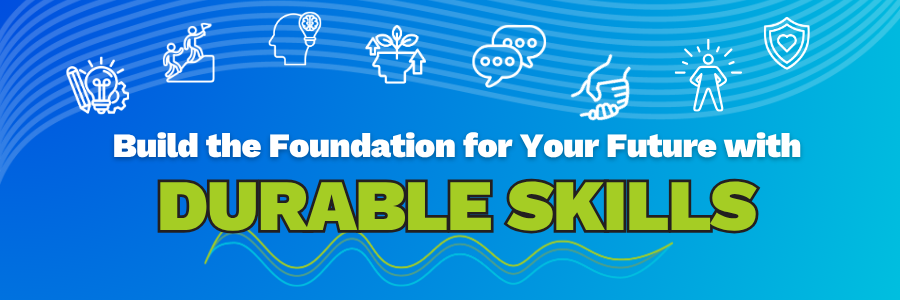Durable Skills: Critical Thinking 🧠⚡
Last updated June 26, 2025
If you enjoy analyzing information, identifying patterns, and making thoughtful decisions, you likely have a good foundation of critical thinking skills. Watch the video and read more below about how critical thinking—a key durable skill—helps you solve problems and make smarter decisions, both at work and in your personal life!
What is critical thinking?
Critical thinking is the ability to take in new information to make decisions and find solutions to challenges. Critical thinkers can easily analyze information and identify patterns confidently to problem-solve as an individual or part of a team. It helps you separate emotion from logic to see the bigger picture in all types of situations.
Why critical thinking matters
Whether you realize it or not, you are constantly making decisions in work, school, and life. Whether you’re deciding what to eat for breakfast before school or when to study for an upcoming test, you are making small decisions that can have a big impact. Critical thinking can help you make these decisions wisely!
Like many of the durable skills, critical thinking is just as valuable in the workplace as it is in your everyday life. Employers love critical thinkers because they’re adaptable, thoughtful, and ready to tackle tough situations. They also strengthen teamwork by offering thoughtful insights, asking the right questions, and encouraging collaboration.
Additionally, critical thinking is essential in the age of technology and AI. While AI can quickly and easily generate content, it needs human intelligence to determine whether the information it presents is accurate, truthful, and ethical. AI is fast, but it can be wrong. The ability of a critical thinker to question and verify will always be in demand.
Actionable ways to grow your critical thinking skills
Here are a few specific ways you can grow your critical thinking skills:
Pause before reacting
If you’re having a disagreement with a friend or see something on social media that you find annoying or upsetting*, take a second to think about it a bit more before reacting. Ask yourself questions like “Why do I feel this way?” or “Do I have all the facts?” This can definitely be difficult in stressful moments, but pausing to think critically about information being presented to you can train your brain over time to analyze instead of jumping to conclusions. Reacting with emotion is natural and human, but not always what’s best.
*There are exceptions to this. Social media can be a scary place, so protect your peace of mind by restricting the content you consume. You deserve to scroll and connect with others in a safe way!
Break down big challenges
The next time you’re working on a project for school or planning an event for your club, try breaking down all the moving parts into steps. What should take priority, and what can wait to be solved down the road? By organizing complex projects or tasks into parts, you can focus on one thing at a time. Your brain will also start to see systems and patterns, which can lead to better decision-making down the road.
Why critical thinking is a lifelong skill
In a world full of noise and instant reactions, critical thinking helps you stand out as someone who stays calm, curious, and clear. You can become someone who asks good questions, solves problems, and sees the bigger picture in all areas of life.
Want to learn more about durable skills? Dive into the essential and timeless skills that help young people thrive in work, school, and life to achieve long-term success!
